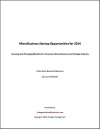Cottage Industrial Revolution is a U.S. based company, offering Consulting Services to the United States and Canada.
The Hourly Rate Trap
Hourly rates have become a standard in employment, both for pay to employees, and for subcontractors as a method of charging for their services. It is rather surprising to me how many people just accept that this is the only way to earn.
Hourly rates are a trap. Because in any given industry, a person will ask, "What do you charge per hour?". Then they comparison price based on that figure. Some are willing to understand that many people who charge more, do the work faster (or better), so it is worth hiring them. But the vast majority will only exceed the standard rates for that industry by a small margin before they seize up and go somewhere else. You are capped at how much money you can earn per day. There is a solid ceiling above which you cannot go. This is the hourly rate trap. And this is the thing that is SO EASY to overcome, once you understand how, and it is NOT by selling "online courses", or other info-products (which has its own set of problems, and its own limitations, and a good deal of work without pay before you ever DO get paid, IF you ever do!).
When we developed our web services, we did it differently. I always quoted a flat rate for everything. I had a fairly good idea of how much time it should take, and I added a buffer for those jobs that are unpredictable (where one time takes 5 minutes, the next time takes 2 hours, due to unforeseen complications - and with web development there were a LOT of those!). I quoted the rate, and stood by it.
At first, I did this because I was a work at home mom. It is hard to track hours when you are constantly being interrupted, and might have to go feed the baby at any time, or other things where it is hard to start and stop the clock. Tracking hours was a practical impossibility. So flat rates were really the only way I COULD bill for services.
Over time, this proved to be one of the most liberating things we ever did! It opened up earnings possibilities like you cannot imagine. It had only two drawbacks, and those were pretty much containable.
The advantages:
1. I did not have to run a clock, and stop it and start it during work hours. I was free to pick up the phone, attend to a child, go to the bathroom, whatever I needed to do, and NEVER WORRY about whether I was cheating the customer or not.
2. I could offer a better price over time than my competitors. There is a reason for that, which is the next thing on this list.
3. Over time, I was well motivated to get FASTER at every task I did. I have good analytical skills, and was able to isolate the areas of time wasting, and eliminate them. The faster I got, the more I made. There was no ceiling on how much I could earn.
4. I was no longer trapped by the hourly rate limit. My income was determined by my ability to produce the work, and not by someone else's idea of what was expensive.
5. My rates were predictable. The customer knew EXACTLY what it would cost them, no exceptions, and the rates ended up being very reasonable within the industry. Since my target was small businesses, they appreciated not having open ended tabs running on every task, where they did not know what something would cost until it was done.
6. Quoting by the task made me look at our services very carefully, to ensure that I NEVER did anything for the customer that would not make them money, or that would waste either my time or their money. We analyzed everything we were doing for effectiveness, and left out those things that simply were not worth the time, so that when we quoted a full service, we knew what was most important to include, and what was not worth including. When segmenting those services, we were then able to tell customers what things they should not pay for separately, because they were not worth their money. That gave us a HUGE advantage over our competitors, because most of them continued to charge for many useless services, and we were the only company telling them they were not needed, and explaining why.
7. I got very good at estimating time and potential problems, so I could quote a service I had never done, and be fairly close. Sometimes I got stung - I'd under-quote. Sometimes I'd over-quote, but the customer always thought it was reasonable anyway, since everyone else was over-quoting on it also on their hourly estimates (and usually charging for that anyway). But within 1-2 times of offering the service, I'd know exactly what to charge for it.
The only two disadvantages were that it could sometimes be confusing to quote on a service for the first time, leaving that potential to get stung if I did not research well, and the one drawback that I never did find a solution for - that if I hired a subcontractor, they would refuse to take the pay that I offered, which was according to the time it would take me to do the task. Because I learned to work faster, those who charged by the hour would not work for me, because they never bothered to learn to work fast enough to make good money at it. Sad, because if they had applied themselves a little, they could have made FAR BETTER money at what I paid them than they could by billing $50 an hour.
Over all the years of providing those services in that manner (close to 20 years now), I only ever had ONE customer INSIST on an hourly rate. And sure enough, when I told her what I made per hour on our services, she ran as fast as she could to find someone less skilled. I explained to her that we did NOT charge by the hour, but by the task, and that I worked faster than my competitors, so she would be paying for services at an effective rate of $50 per hour for highly skilled work, but that if she insisted that I bill by the hour, I'd have to bill $150 per hour. She bolted, aghast that I would have the audacity to charge her such a rate! Her corporate mentality was incapable of comprehending that an hourly rate is NOT a good means of determining value!
Having done this, I'd never go back. I'll never lock myself into a cage that is built of someone else's idea of what I should earn per hour. I'll also never hire an employee by the hour, or a subcontractor, for anything I cannot oversee in person, because otherwise it is just an invitation to them to treat my time in a casual manner. There is nobody who is so motivated to get the work done, and do it right, as someone who gets paid when it is done correctly, and who only gets the amount agreed upon. That employee, who is paid by the piece, or by the task, will work hard, and will become extraordinarily proficient at the job, as soon as they understand that if they do, their income will increase dramatically.
I am always fair about what I pay those who work for us. I always want to ensure that if I can do it in THIS amount of time, then I will pay them enough to earn really well if they do it competently, but a little more slowly than I do, and so they can earn exceptionally well if they work as fast as I can. But I won't pay them enough to earn well if they don't bother to learn to do the task proficiently. They are the ones then, who determine their own earnings potential, and they decide whether they want to earn minimum wage by doing a marginal job, median wage if they do an adequate job, or high wage if they do an outstanding job.
This is the one thing we did from the start, that made the biggest difference in our business model, as far as earnings potentials were concerned. It was a small choice, made of necessity, which influenced so very many things about how we did business. And it was probably the best choice we have ever made.

